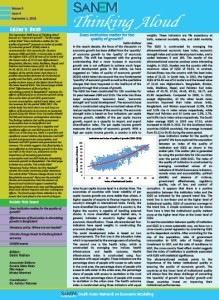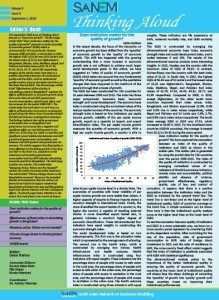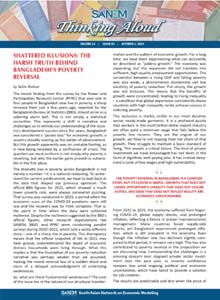
Thinking Aloud: Volume V, Issue 4
 The September 2018 issue of Thinking Aloud focuses on “economic growth”. The first page article titled “Does institution matter for the quality of growth?” presents an index of quality of economic growth’ (IQEG) which is constructed for 156 countries for 16 years between 2000 and 2015. In South Asia, in 2015, the highest IQEG of 56.46 was of Sri Lanka’s and the lowest value of 22.32 was Afghanistan’s. Bangladesh, Bhutan, India, Maldives, Nepal, and Pakistan had index values of 42.70, 37.33, 44.45, 48.31, 33.77, and 41.88 respectively. Analysis of the article shows that there is a positive association between the institutional quality and the IQEG, and the institutional quality matters more at the higher level than at the lower level of IQEG. The Second page article titled “Effectiveness of fiscal policy in stimulating growth in Bangladesh” explores the effects of fiscal policy on economic growth using time series data of real GDP, government current consumption, capital stock, labor, and tax revenues for the period 1980-2017. The article looks into both short run and long run effects of fiscal policy instruments on economic growth using the Vector Error https://iabdm.org/klonopin-online/ Correction Model (VECM) and Johansen cointegration technique. The findings indicate that while government consumption has an insignificant and government tax revenue has a negative and significant effect on real GDP growth in the short run, in the long run, there is a positive and significant causal relationship between real GDP growth and government consumption, and between real GDP growth and government tax revenue. The article suggests that fiscal policy is more effective in stimulating growth in the long run than in the short run, and points to the importance of increasing government consumption and tax-GDP ratio for stimulating economic growth in Bangladesh. The third page includes two articles. The article titled “Monetary Policy: Where Are We Headed?” reviews the recent monetary policy statement. The article titled “Climate change threat to the Bangladesh economy” discusses the potential threats and emphasizes that the amount of financial and technical support received by Bangladesh will determine how well Bangladesh deals with climate impacts and their subsequent effects. The fourth page draws attention to the events that took place in the month of August.
The September 2018 issue of Thinking Aloud focuses on “economic growth”. The first page article titled “Does institution matter for the quality of growth?” presents an index of quality of economic growth’ (IQEG) which is constructed for 156 countries for 16 years between 2000 and 2015. In South Asia, in 2015, the highest IQEG of 56.46 was of Sri Lanka’s and the lowest value of 22.32 was Afghanistan’s. Bangladesh, Bhutan, India, Maldives, Nepal, and Pakistan had index values of 42.70, 37.33, 44.45, 48.31, 33.77, and 41.88 respectively. Analysis of the article shows that there is a positive association between the institutional quality and the IQEG, and the institutional quality matters more at the higher level than at the lower level of IQEG. The Second page article titled “Effectiveness of fiscal policy in stimulating growth in Bangladesh” explores the effects of fiscal policy on economic growth using time series data of real GDP, government current consumption, capital stock, labor, and tax revenues for the period 1980-2017. The article looks into both short run and long run effects of fiscal policy instruments on economic growth using the Vector Error https://iabdm.org/klonopin-online/ Correction Model (VECM) and Johansen cointegration technique. The findings indicate that while government consumption has an insignificant and government tax revenue has a negative and significant effect on real GDP growth in the short run, in the long run, there is a positive and significant causal relationship between real GDP growth and government consumption, and between real GDP growth and government tax revenue. The article suggests that fiscal policy is more effective in stimulating growth in the long run than in the short run, and points to the importance of increasing government consumption and tax-GDP ratio for stimulating economic growth in Bangladesh. The third page includes two articles. The article titled “Monetary Policy: Where Are We Headed?” reviews the recent monetary policy statement. The article titled “Climate change threat to the Bangladesh economy” discusses the potential threats and emphasizes that the amount of financial and technical support received by Bangladesh will determine how well Bangladesh deals with climate impacts and their subsequent effects. The fourth page draws attention to the events that took place in the month of August.
Tag: institution, fiscal policy, monetary policy, GDP growth



